|
|
|
Sort Order |
|
|
|
Items / Page
|
|
|
|
|
|
|
| Srl | Item |
| 1 |
ID:
145855
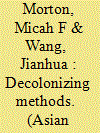

|
|
|
|
|
| Summary/Abstract |
The concept of indigeneity is highly problematic in Asia, where a heightened degree of spatial mobility and ethnic fluidity challenge conventional understandings of Indigenous peoples (IPs) as rooted, stable, and unchanging from time immemorial. As some scholars have argued, however, this conception of indigeneity ignores the fact that many IPs have had multiple experiences of displacement due to their colonization by outsiders. Here, the authors discuss one such group – the Akha minority residing throughout the Upper Mekong Region – that in spite of multiple historical experiences of displacement, marginalization, and, more recently, colonization has maintained an intimate connection with their ancestral homeland. Akha have maintained this connection by way of their ‘intimate place-making cosmographies’, whereby non-Akha space is reconfigured as a microcosmic totality of the larger Akha cosmos. These practices have allowed for Akha to sustain and vitalize their distinct identity as Akha in the face of various external pressures from non-Akha others.
|
|
|
|
|
|
|
|
|
|
|
|
|
|
|
|
| 2 |
ID:
145853
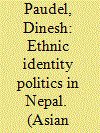

|
|
|
|
|
| Summary/Abstract |
The ethnic issue has dominated Nepal’s political landscapes since the birth of the Republic of Nepal in 2007. For decades, Nepal witnessed a series of peasant rebellions against the state and landed aristocrats. Ethnic peasants were at the forefront, demanding autonomy, dignity, and an end to state violence. Since the 1980s, however, the ‘ethnic question’ has become a development issue and the developmental idea of indigeneity has consolidated both ethnic elites and peasants. Recently, identity politics has become a dominant ideological force, rapidly unraveling the course of radical political developments in the country. Interestingly, this political movement emerged in a particular historical conjuncture where Nepali politics has been extensively shaped by the recent Maoist revolution and a long history of international development. This paper explores various aspects of ethnic peasantry and argues that the notions of indigeneity and identity politics have reinforced elite domination by depoliticizing ethnic peasant politics in Nepal.
|
|
|
|
|
|
|
|
|
|
|
|
|
|
|
|
| 3 |
ID:
145850


|
|
|
|
|
| Summary/Abstract |
This introduction presents background information about some of the ways that the concept of indigenous peoples is emerging but is also being contested in Asia. Indeed, many governments in Asia accept that there are indigenous peoples in the world, but claim that the concept does not apply to them due to a relative lack of European settler colonization in the continent. This is why many governments of Asia signed onto the United Nations Declaration on the Rights of Indigenous Peoples (UNDRIP) in 2007, but with the understanding that UNDRIP does not apply to them. This has become known as ‘the salt-water theory’ or the ‘Asian controversy’. This special issue includes five articles that variously consider the ways that the concept of indigeneity is being deployed in various parts of Asia, including Cambodia, Myanmar, and Nepal, and also transnationally between Thailand, Myanmar, China and Laos; and between Cambodia, Vietnam and the United States.
|
|
|
|
|
|
|
|
|
|
|
|
|
|
|
|
| 4 |
ID:
145854
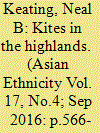

|
|
|
|
|
| Summary/Abstract |
Bunong people from both sides of the Cambodia–Vietnam border are increasingly self-identifying as Indigenous peoples and claiming collective human rights as Indigenous peoples at international platforms, such as the United Nations Permanent Forum on Indigenous Issues. As of now the Bunong from Vietnam articulate Indigeneity from a diasporic distance, having fled the country as political refugees. The aim of this article is to compare and contrast the networks of Bunong Indigeneity that now seek cross-border and transnational connections, and examine the blockages and openings that appear as a result. The border between Vietnam and Cambodia separates Bunong communities and families spatially, politically, and culturally. Cambodia recognizes Indigenous peoples, while Vietnam does not. Through primary research with Bunong activists, combined with secondary sources, this article adopts a comparative cross-border approach to the Bunong articulation of Indigeneity, and asks where this movement may be headed.
|
|
|
|
|
|
|
|
|
|
|
|
|
|
|
|
| 5 |
ID:
145852
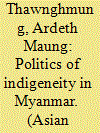

|
|
|
|
|
| Summary/Abstract |
This paper addresses a key issue that remains under-studied in discussions of Buddhist–Muslim hostility and violence in the northern Rakhine state in Myanmar. It reveals how the public narratives of both Rakhine Buddhist and Muslim political parties rely on the concept of ‘indigeneity’ to assert their claims as citizens and rightful sons of the soil, and to discredit the other’s position. This paper argues that this discourse, and the debate as it is presently formulated, has deepened the gap between two communities and obscured opportunities for identifying common ground that could be leveraged to foster more pragmatic approaches to deep-seated communal problems.
|
|
|
|
|
|
|
|
|
|
|
|
|
|
|
|
| 6 |
ID:
145851
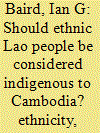

|
|
|
|
|
| Summary/Abstract |
The ethnic Lao are not well-known in Cambodia, despite constituting a substantial but unrecorded population there. Even though the Lao have lived in Cambodia for many generations, they were excluded from being considered ‘indigenous peoples’ when the category was legally introduced to Cambodia through the 2001 land law. Instead, they are not classified as ‘ethnic Lao’, except for the very few who were actually born in Laos. Here, I consider how the politics of identity in Cambodia has separated some highland ethnic minorities from the Lao. Many ethnic Lao in Cambodia quietly disagree with not being classified as indigenous. This contestation represents a similar dynamic to the differences of opinion between the Asian Indigenous Peoples Pact (AIPP) and the peasant organization, La Via Campesina, regarding advocating for indigenous and peasant rights, respectively. My objective is to demonstrate that the politics of indigenous categorization in Cambodia is complicated and fraught.
|
|
|
|
|
|
|
|
|
|
|
|
|
|
|
|
|
|
|
|
|